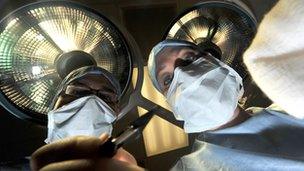Health minister warns on targets as waiting times rise
- Published

Welsh health officials said their survey threw up 'some surprises' on people's attitude to NHS reform
Health Minister Lesley Griffiths has warned NHS managers they must meet strict targets or face the consequences.
She told the Welsh NHS Confederation's annual conference that officials must meet performance and financial goals.
They are meeting in Cardiff to discuss broad and potentially controversial changes to the NHS in Wales.
It comes as a poll for NHS health boards found 61% would be prepared to travel for better specialist services.
However, most are still opposed to concentrating services in fewer and larger hospitals.
It is set against the background of a major overhaul in the NHS announced by Mrs Griffiths last week.
She has insisted no district hospitals will close and services will not be downgraded, but she has admitted patients may need to travel further for the best treatment.
She is expecting health boards to submit plans later this month explaining how they will reorganise services.
The minister's warning to the NHS comes on the day that official figures confirmed waiting times for hospital treatment have risen steadily through the year.
At the end of September, 33,312 people had been on a waiting list for longer than the target time of 26 weeks.
The NHS treated 82,386 patients during September - 84% of them within 26 weeks and 97% within 36 weeks of being referred to hospital by their GPs.
'No margin for error'
Mrs Griffiths told the confederation that its members "must achieve the targets which have been set for this year, for both service and financial performance in order for there to be a solid basis on which to move forward over the coming years".
"Let there be no doubt in your mind - you must come in on the financial targets which have been set. There is no margin for error here."
Welsh Liberal Democrat leader Kirsty Williams said: "Even before the traditional added winter pressures, waiting lists are continuing to rise month on month and nowhere near enough is being done about it."
The confederation, which is holding its annual conference in Cardiff, said the YouGov poll showed people appeared to accept tough choices were ahead for the NHS.
Most people were still opposed to concentrating services in fewer, larger hospitals, believing their local hospital should provide every type of service.
However, the poll found most people then said they did not mind travelling for specialist care if it meant the care would be higher quality.
'Prepared to accept change'
The survey found:
Only 15% agreed that the NHS should keep old hospital buildings open, "even if they are not fit for modern health care".
75% agreed that more could be done to care for people at home and prevent them from having to go to hospital in the first place.
61% were prepared to travel for better specialist health services.
In comparison, 21% of those said they wanted specialist services at their local general hospital, even if it "isn't as good as somewhere further away'.
Confederation director Helen Birtwhistle said: "A great deal of opposition to change, particularly from politicians, is based on the premise that the public won't accept it.
"In fact, while it is clear that people believe their local hospital should provide every type of health service for the local community, for example, they are nonetheless prepared to accept change if it improves quality and safety."
Prof Marcus Longley, health economist at the University of Glamorgan, said the survey showed the need for leadership over expected changes in NHS provision and to persuade the public that this was not about merely saving money.
The YouGov survey was online with a sample size of 1,004 adults and took place between 27 October-1 November.
- Published10 November 2011
- Published2 November 2011
- Published1 November 2011
- Published20 October 2011
- Published21 September 2011
- Published20 September 2011
- Published7 September 2011